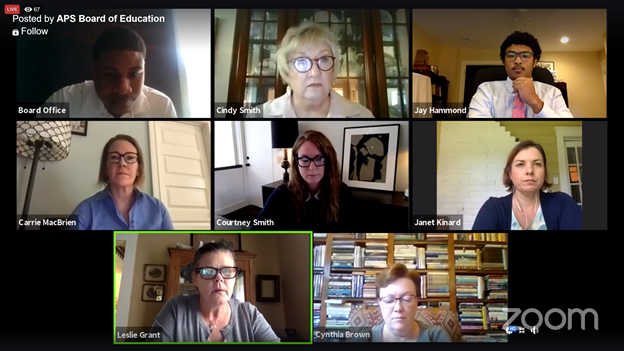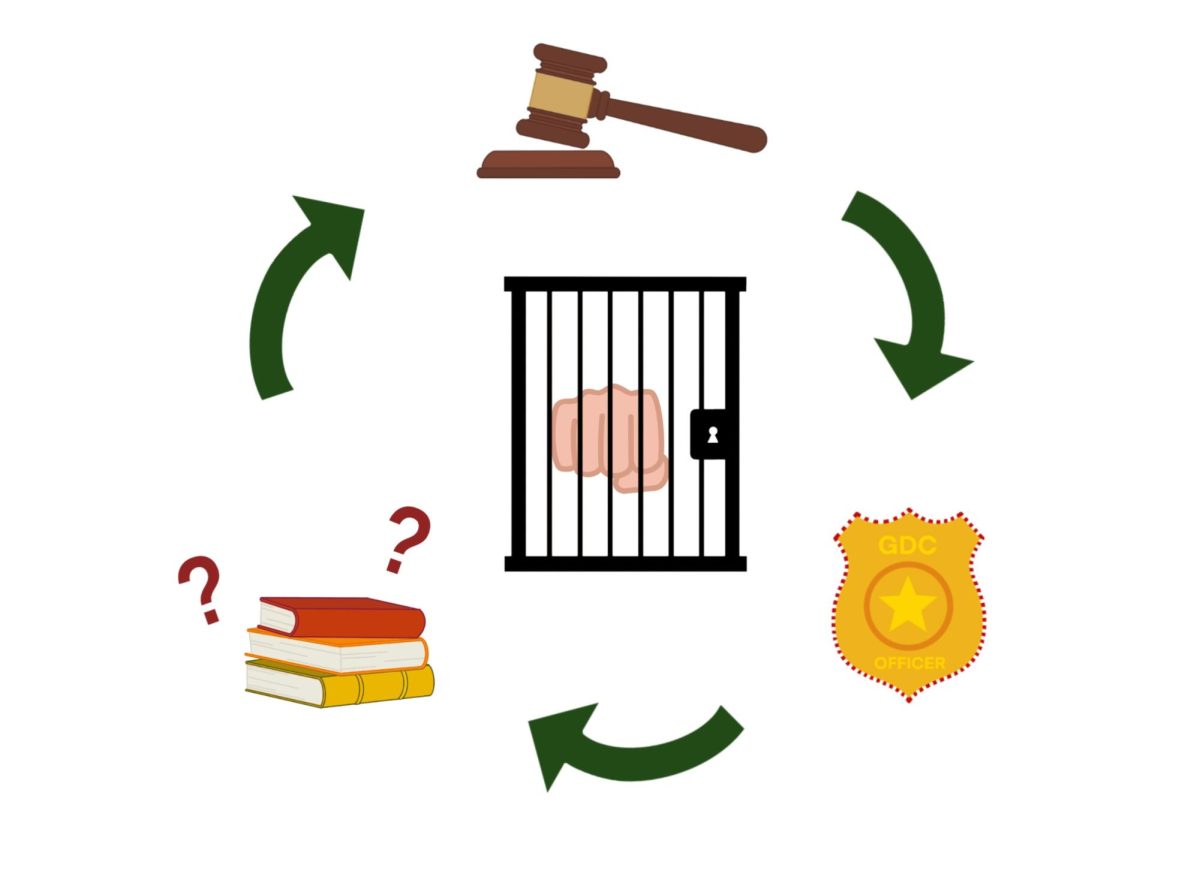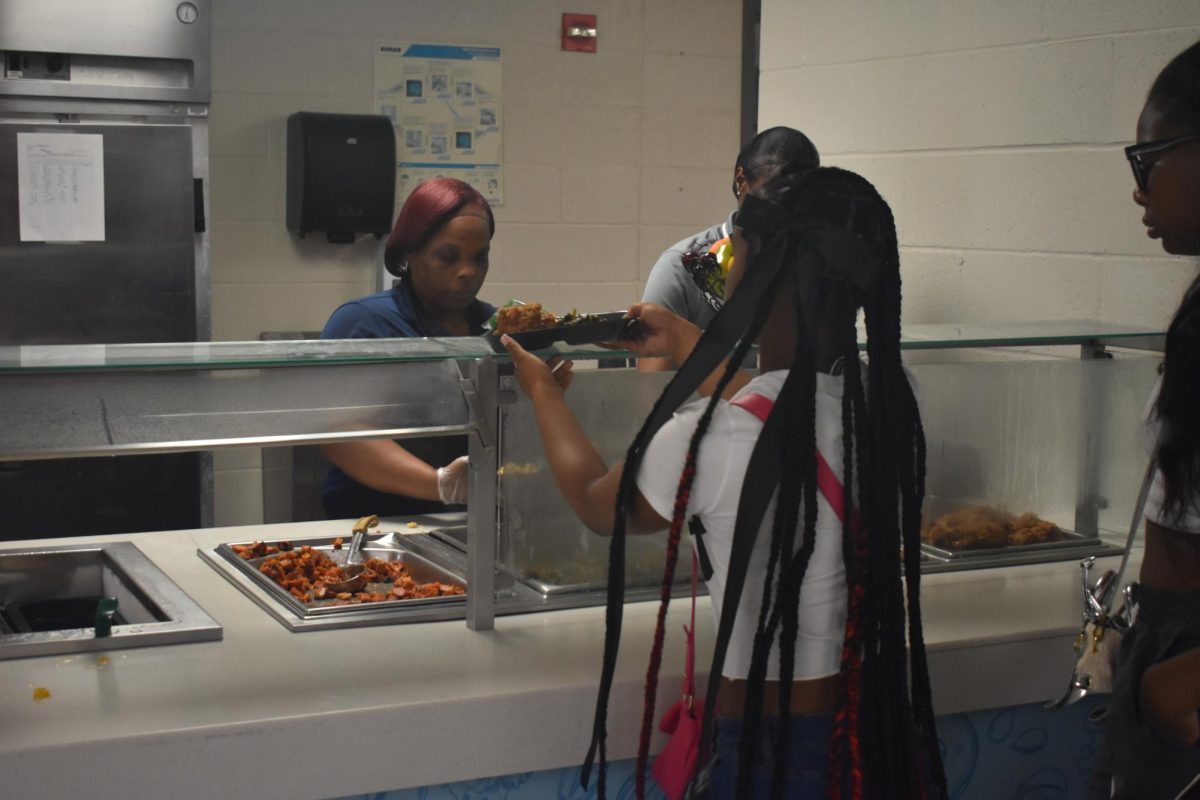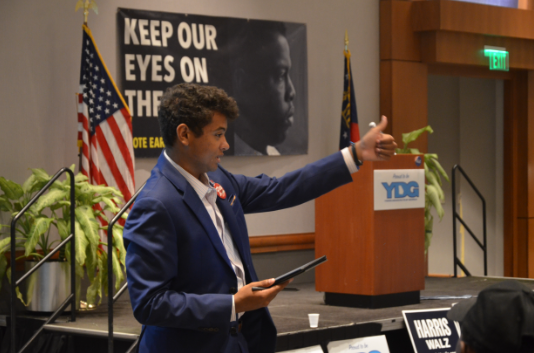Community, alumni deliberate school name change
Chair of the Henry W. Grady Naming Committee Leslie Grant outlined the series of Facebook Live meetings that will take place. The next meeting is scheduled for Thursday, July 30.
July 7, 2020
The Atlanta school board’s committee to rename Grady outlined the process to consider proposals to change the school’s name.
The July 7 meeting was the first of five virtual meetings held via Zoom and Facebook Live to discuss the possible renaming.
Leslie Grant, committee chair, said during her years working with Atlanta Public Schools, there have been several requests to change Grady’s name. The current political climate in the state and country has fueled the board’s consideration of a name change.
Recent criticisms have centered around the values of the school’s namesake, Henry Woodfin Grady. As the owner of the Atlanta Herald and the Atlanta Constitution, Grady, who died in 1889 at age 39, made great strides in journalism and bringing industry to the South. While he made many positive contributions, he was also a supporter of segregation, and many of his ideas aligned with those of white supremacists.
According to the board, “When a facility is to be named or a name change is proposed, the board chair shall appoint a special committee to consider nominations and make a recommendation to the board.”
The naming committee consists of seven community members appointed by Board Chair Jason Esteves. The committee members include district representatives and Grady alumni. Grady’s representatives include Class of 2020 graduate Jay Hammond and Assistant Principal Carrie MacBrien.
The naming committee anticipates holding five meetings. Two, on July 30 and Aug. 4 will be provide for two hours of public comment.
During the fourth and fifth meetings, a the committee will deliberate and a recommendation will be sent to the board for a vote at its meeting in early September.
During Tuesday’s meeting, the committee opened the floor for public comment. Seventeen people expressed their opinions, with 13 for and four against a name change.
Rebecca Snow, Class of ‘64, opposes a name change.
“I found that he [Henry W. Grady] was a man of great talent in oratory who was instrumental in bringing industrialization to the South, Atlanta, in particular, during the Reconstruction Era after the Civil War resulting in destruction of the land and economy,” Snow said. “I am convinced that his oratory engagements in Northern industrialized cities was the catalyst that lead to Georgia’s and Atlanta’s recovery economically, ultimately making Atlanta the city it is today.”
Senior Joy Delaney finds that the pros of changing Grady’s name outweigh the cons because of what Grady stood for and his extensive writings on the “separate but equal” policy.
“I personally agree that there should be a name change. As a black student, I feel like it’s extremely disrespectful to continue to have this name while knowing the full history behind it is very insensitive and needs to change,” Delaney said. “This would be a huge change for the students, staff and community, but it’s a change that needs to happen. We cannot all feel included and wanted if there’s a name attached to us that isn’t for us all, especially a name of someone who wouldn’t want us in a school simply based on our race.”
Class of ‘68 alumna Hedy Schreibman Borenstein recognizes the significance that Grady had on Atlanta’s rich history and the New South.
“Henry W. Grady should keep this honor, as well as the honored names of Grady Hospital, University of Georgia’s Grady School of Journalism and the Grady statue [in downtown Atlanta],” Borenstein said. “This is our history, this is our city, and this is our school, which we are proud to say we attended. Almost every alumni I’ve had contact with has supported keeping the name of Henry W. Grady in our city as a symbol of change and moving forward after the Civil War.”
Social studies teacher James Sullivan also recognizes the importance in remembering influential figures from the past but does not always agree with memorializing them.
“While Henry W. Grady wasn’t a Confederate figure and, in his time, was even seen as fairly progressive on some “New South” issues, he was also not a supporter of racial equality in his ‘New South,” Sullivan said. “We name things after people to celebrate those people. As the name change proposal by Grady High School students so perfectly states, figures like Henry W. Grady should ‘be studied, not celebrated.’”
Grady parent Susan Ledbetter, mother of sophomore Max Ledbetter and Class of ‘20 alumna Olivia Ledbetter, feels that the student body should be able to decide how they want to name the school.
“I think that the students and faculty should decide if they would like a name change for their school,” Ledbetter said. “No one should have to feel anger, excluded or embarrassed by the name of the school.”
Social studies teacher Mary Van Atta acknowledges the importance of the student body in shaping a school rather than its name.
“I feel, though that my voice as a faculty member is less important on this issue than those of current students and alumni, it is really your [students’] school,” Van Atta said. “While I have been proud to work with students for 26 years at Grady and to share the successes and heartaches of many alums, I feel a strong dedication to you, not to a school name.”
Grady alumni, current students, staff and community members have split opinions on the proposal to change Grady’s name. The school was named for Henry Grady in 1947 after the merger of Boys and Tech high schools, which shared the campus on Charles Allen Drive, created one coed school.
“This will not be an easy deliberation,” Grant said. “It is a very big decision for our system and for the city.”







Ellen Travis Stropp • Aug 10, 2020 at 2:02 pm
I am a Grady alumna & I do see the logic of changing the school name. However,
the situation should be handled in a
constructive way by directing ourselves toward
NOT considering using people’s names.
To be completely honest, using anybody’s name
has entirely too much potential for becoming
a political football. We all need to be cognizant
of avoiding a “We win, you lose” outcome,
which certainly will create some resentments.
Let us stop being childish & pretending that coming close to that sort of divisive outcome won’t have
a deleterious effect on the community in the future.
We must seek a name that reflects inclusiveness for all. So, let’s all be grown up enough to be desirous of compromise & therefore, purposely aim at a different kind of name, such as a reference to
the school’s location. There are plenty of
possibilities: Piedmont Park High School,
Tenth Street High School, Monroe Drive High
School, Midtown High School, to name a few.
This turns out to be a much more sensitive matter
than it appeared to be at first glance. The
Atlanta Public School Board ought to issue
a public statement that they are committing
to fairness & inclusiveness for all as a guiding principle for this honorable institution’s name change. As a graduate of Grady, I feel that
NOT using this chance to truly become an even
more inclusive community would amount to negligence & mismanagement on the part of
the APS committee charged with this task.
Thank you.
Julia Cothran Bernath • Jul 11, 2020 at 11:19 am
I wanted to commend you on your fair and unbiased reporting of the possibility of renaming Grady High School. As a Grady alum, a Southerner alum and a graduate of the UGA journalism school, I am so proud that you were still adhering to the tenants of journalism to give fair and honest reporting. So many professional news outlets today are not adhering to that basic tenants of journalism, and I am so happy that your newspaper is still the quality publication that I have always remembered.